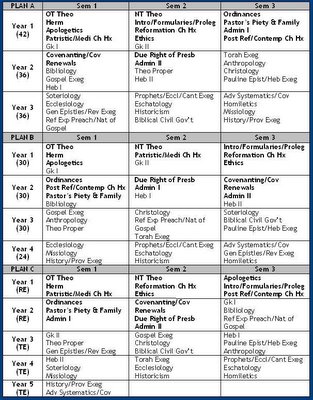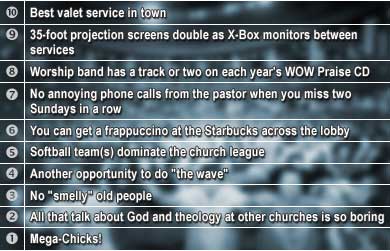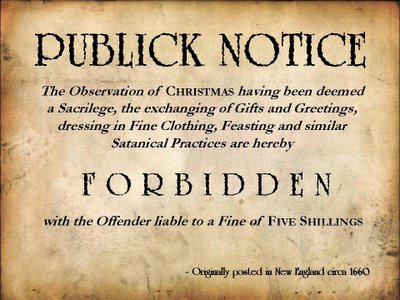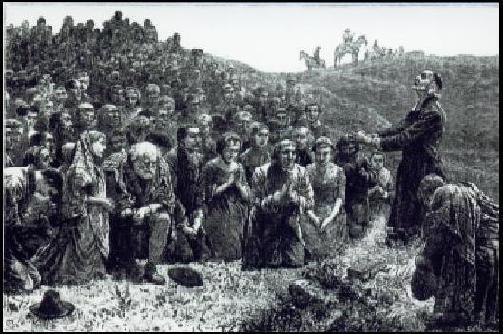So this is hopefully my 3rd and final edition for a Seminary course for both the Teaching Elder Office and the Ruling Elder Office. I took many more of your suggestions and edited the course work. A few of you commented that this was too lofty for any Master’s course. While I disagree, looking at such prominent and not-so-prominent Seminary Curriculums as:
Puritan Reformed Theological Sem - MDiv.
- 4 years
- 136 to 140 Credit hours [114 if you already have Heb/Grk}
Greenville Presbyterian Theological Sem - MDiv.
- 4 years
- 124 Credit hours – M. Div.
- 31 Credit hours for a Ruling Elder Program
Calvin Theological Sem - MDiv.
- 3 or more years
- 138 Credit hours
Westminster Theological Sem - MDiv.
- 3 or more years
- 92 Credit hours
Reformed Presbyterian Theological Sem – MDiv.
- 3 or more years
- 135 Credit hours
Reformed Theological Sem – MDiv.
- 3 or more years
- 106 Credit hours
I did decide to cut programs down, and so the stats at present look like:
- 3 or more years
- 114 Credit hours in 38 classes
As I said before, I did use a lot of courses titled after Puritan Reformed Theological Seminary because they have many of their Seminary lectures taped, so they would make great supplements, until we have our own.
Notice that the red numbers are referenced at the bottom of the document and have new footnotes. Most of them justify changes made to classes. The terms are out of order just to fit full pages. The BOLD classes are one that would fit both the Ruling and Teaching Elder’s curriculum.
The next steps in this process is to
1) separate the classes into a 3 year to 5 year programs
2) determine which lectures from PRTS will fit with the courses outlined.
3) begin a collection of texts for each class (Please feel free to offer recommendations)
4) write a syllabus for each course
Thanks, and be enthused. May the LORD be pleased to use the simple things to advance the next Covenanted Reformation.
-Shawn
----------------------------------------
- PRE-SEMINARY [1] -
1. Communicant Membership
2. Acquainted w/ Subordinate Standards
3. OT/NT Bible Introduction [2]
4. 1 semester of Biblical languages each
5. Logic/Critical Thinking Intro
6. Communications Intro(Research/Writing/Speaking/Listening)
7. ** Seminary Entrance Exam ** [3]
8. ** Liberal Arts Ed ** [4]
----------------------------------------
TERM 1 - An acknowledgment of the Old and New Testament to be the Word of God, and the alone infallible rule of faith and practice.
1. Hermeneutics (3) [5]
2-4. OT Exegesis: [6]
- 2E. OT 1 – Torah/Psalms (3)
- 3E. OT 2 – History/Proverbs (3)
- 4E. OT 3 – Prophets/Eccl/Canticles (3)
5-7. NT Exegesis:
- 5E. NT 1 – Gospels/Acts (3)
- 6E. NT 2 – Pauline Epistles/Hebrews (3)
- 7E. NT 3 – General Epistles/Revelation (3)
8. OT Biblical Theology (3)
9. NT Biblical Theology (3)
10-13. Biblical Languages:
- 10BL. Hebrew I (3)
- 11BL. Greek I (3)
- 12BL. Hebrew II (3)- 13BL. Greek II (3)
Teaching Elder - (14 Classes – 42 Credits)
Ruling Elder - (3 Classes – 9 Credits) [7]
----------------------------------------
TERM 2 - That the whole doctrine of the Westminster Confession of Faith, and the Catechisms, Larger and Shorter, are agreeable unto, and founded upon the Scriptures
1-8. Systematics:
1S. Intro/Formularies/Prolegomena [8] (3)
-- a. Universal Formularies
-- b. Scottish Formularies
-- c. Westminster Formularies:
-- d. RP Formularies
2S. Bibliology (3)
3S. Theology Proper (3)
4S. Anthropology (3)
5S. Christology (3)
6S. Soteriology (3)
7S. Ecclesiology (3)
8S. Eschatology (3)
9. Advanced Systematics/Advanced Covenanting [9] (3)
Teaching Elder - (9 Classes – 27 Credits)
Ruling Elder - (1 Classes – 3 Credits)
----------------------------------------
TERM 3 - That Presbyterial Church Government and manner of worship are alone of divine right and unalterable; and that the most perfect model of these as yet attained, is exhibited in the Form of Government and Directory for Worship, adopted by the Church of Scotland in the Second Reformation
A) Liturgics/Worship
1. Ordinances: Intro – Directory for Worship (3)
-- a. Prayer
-- b. Psalmody
-- c. Reading
-- d. Sabbath/Special Occas. (Fastg/Thnksgivg/Scrmnts/CovRen)
2. Homiletics: (3)
-- a. Sermon Preparation, Construction, Delivery
-- b. Sermon Preparation for Special Occasions
3. Reformed Experiential Preaching & The Nature of the Gospel (3)
B) Form of Government
4. Due Right of Presbyterianism – Form of Church Government (3)
C) Work of the Ministry
5. Administration I (3)
-- a. Leadership
-- b. Ordination
-- c. Ecclesiastical Meetings
6. Administration II (3)
-- a. Counseling - Nouthetics
-- b. Visitations/Marriages/Burials (3)
7. Missiology (Postmillennial Maturity) (3)
-- a. Church Planting and Maturity in the Faith
-- b. Evangelism and Effecting Social Reformation
Teaching Elder - (7 Classes – 21 Credits)
Ruling Elder - (4 Classes – 12 Credits)
----------------------------------------
TERM 4 - That public, social covenanting is an ordinance of God, obligatory on churches and nations under the New Testament; that the National Covenant and the Solemn League are an exemplification of this divine institution; and that these Deeds are of continued obligation upon the moral person; and in consistency with this, that the Renovation of these Covenants at Auchensaugh, Scotland, 1712 was agreeable to the Word of God
1. Biblical Civil Magistracy (3)
2. Covenanting & Covenant Renewals (3)
Teaching Elder - (2 Classes – 6 Credits)
Ruling Elder - (1 Classes – 3 Credits)
----------------------------------------
TERM 5 - An approbation of the faithful contending of the martyrs of Jesus, especially in Scotland, against Paganism, Popery, Prelacy, Malignancy and Sectarianism; immoral civil governments; Erastian tolerations and persecutions which flow from them; and of the Judicial Testimony emitted by the Reformed Presbytery in North Britain, 1761 with supplements from the Reformed Presbyterian Church; as containing a noble example to be followed, in contending for all divine truth, and in testifying against all corruptions embodied in the constitutions of either churches or states
1-3. Church History:
- 1CH. Patristic Church & Medieval Church (3)
- 2CH. Reformation Church (3)
- 3CH. Post-Reformation Church & Contemporary Church (3) [10]
4. Historicism (3) [11]
5. Apologetics (3)
-- a. World Religions
-- b. Popular Heresy in the Church
Teaching Elder - (5 Classes – 15 Credits)
Ruling Elder - (4 Classes – 12 Credits)
----------------------------------------
TERM 6 - Practically adorning the doctrine of God our Saviour by walking in all His commandments and ordinances blamelessly
1. Ethics (10 Commandments) (3)
2. The Pastor’s/Elder’s Family & Personal Piety (3)
Teaching Elder - (2 Classes – 6 Credits)
Ruling Elder - (2 Classes – 6 Credits)
----------------------------------------
Total: (38 Classes – 114 Credits) (15 Classes – 45 Credits)
----------------------------------------
- ELECTIVES - [12]
1. The Christian School
2. Ministry to the Jews
3. Ministry to Roman Catholics
4. The Urban Church
5. Martyrdom, the Confessing Church, & Historic RP Testimony Bearing (3)
----------------------------------------
All plans can be rearranged and only offer a sample of a 3 year [PLAN A], 4 year [PLAN B], and Ruling Elder program bridging into a Teaching Elder program [PLAN C].
I think that it is important how we put together each semester. I think it best NOT to put classes from the same Term in a semester, unless necessary. I have put much thought into why I have ordered the semesters as I have, basically seeking to build more advanced classes upon more fundamental classes. An approach similar to addition, subtraction, multiplication, and division, prior to Algebra, etc.
Realistically I don't see myself doing this program sooner than 4 years (30 credits a year) with the idea that if I happen to finish a particular section early, than I can move onto the next section early. The BOLD classes are Ruling Elder classes.

[1] The Pre-seminary tract is simply a set of prerequisites that ought to be considered prior to entry into a seminary education/oversight.
The rest of the classes are split up into categories best suited for the Term of Communion cited above. There is also a list of possible electives at the end of the list. A candidate would normally not move into the Seminary training until having this completed.
[2] Instead of just a read-through of the Scriptures, it would be better if one had an introduction to the Scriptures. This is a Master’s Course, so the bar needs to be raised.
[3] The Stars represent a flexible requirement. There should be an interview of some sort to determine the potential student’s testimony of their faith, abilities and understanding of the ministry. This helps when the examiners do not know the candidates well enough.
[4] The Stars represent a flexible requirement. While a Liberal Arts Education is desired, it may not be necessary depending on present circumstances. Candidates may need to supplement their training. Transfer classes should also be considered.
[5] Next to each course is listed the credits per class. At this point all classes are (3) Credits each.
[6] Each student is required to study Exegesis for each section of the Scriptures. This is after taking 3 semesters of both Greek and Hebrew – That is one semester each in Pre-sem, and then 2 semesters for each in the first 2 years of Seminary training.
[7] There is a sum of the classes/credits for each Term of Communion for both Ruling and Teaching Elder programs.
[8] This class spends time in the differences of particular formularies (creeds, confessions, church orders, etc), principles of development, along with goals and outcomes (scholasticism, orthodoxy), and the history and context surrounding the actual formularies (different from Church history in that it spends detailed time in debates had at these assemblies); Basically setting the ground work for the next ecumenical assembly. The content of the formularies themselves would be "woven into the other classes".
[9] Advanced Systematics – A course that would introduce the student to those issues that have not yet been handled by a General Assembly, but will need to be handled (Of 2 kinds, I – Further Development of the Standards, II – Those issues which former Divines have chosen to wait for a more settled Church and greater Reformation to decide).
Advanced Covenanting –Like Advanced Systematics, it is a course that seeks to put on the table some issues that have gone unanswered, or oppositions that we have not seen answered. It considers further implications of Covenanting in general and the SLC more specifically in its application, seeking to prepare the student with an advanced understanding so that either they would be interested in working on the subject while in ministry, or again, preparing for an ecumenical assembly. We would be influential to this assembly if we had already anticipated pressing issues of reformation. Notice that both topics have been combined into one course (of 2 kinds, I – Further development of Covenanting Principles related to future social Covenanting, II – Principle development to aid in the technical side of social Covenanting).
[10] It seems that the Reformation covers a broader area and longer timeline and so would be a greater amount of content, compared to the Post Reformation Church.
[11] This class would be an introduction to the Historicist Hermeneutic, as well as comparing this hermeneutic to the other prophetic systems. It then takes on a superficial history, outlining the works of the World and the Church side-by-side through history marking major events prophesied. Finally it lines out the future events based upon Scripture.
[12] There really has not been much consideration of electives, because the classes chosen are already of basic and necessary value to the Terms of Communion and a Seminary education. However, you will find elective courses offered at most Seminaries so I thought even a list of them could be helpful if electives were considered in the future.
 The way I see it, there is a sense of real irony in these kinds of churches, because in trying so hard to influence the unchurched (which I am not against in principle), they neglect the 2 kinds of legitimate "Seekers" in the audience of their shows.
The way I see it, there is a sense of real irony in these kinds of churches, because in trying so hard to influence the unchurched (which I am not against in principle), they neglect the 2 kinds of legitimate "Seekers" in the audience of their shows. Christ goes on to say that you can judge the prophet/teacher by their fruit.
Christ goes on to say that you can judge the prophet/teacher by their fruit.





